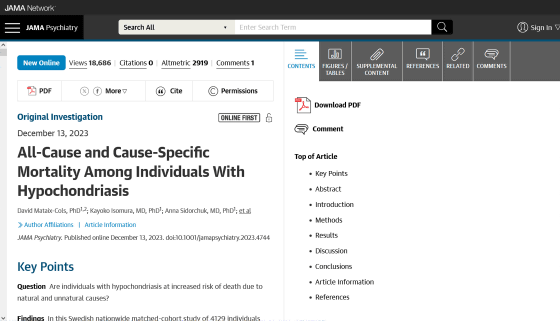It turns out that hypochondriac patients who worry excessively that ``I might have a serious illness'' are more likely to die early.

All-Cause and Cause-Specific Mortality Among Individuals With Hypochondriasis | JAMA Psychiatry | JAMA Network
https://jamanetwork.com/journals/jamapsychiatry/article-abstract/2812786

Hypochondriacs die earlier than those who worry less about their health – what might explain this paradox?
https://theconversation.com/hypochondriacs-die-earlier-than-those-who-worry-less-about-their-health-what-might-explain-this-paradox-219986
Hypochondriasis can be defined as a mental illness characterized by ``excessive worry about one's health,'' often an unsubstantiated belief that ``one has a serious illness.'' As a result, they often seek medical attention due to trivial complaints or misunderstandings, or avoid hospitals altogether for fear of being diagnosed with a truly fatal illness.
A Swedish research team used the national identification number assigned to Swedish citizens to identify 4,129 patients diagnosed with hypochondriasis between 1997 and 2020. Furthermore, we extracted 41,290 people who matched demographically with these subjects, such as gender and age, but did not have hypochondriasis, and analyzed the mortality rate and cause of death from 1997 to 2020. It has been reported that people with hypochondriasis were significantly more likely to be ``born in Sweden,'' ``low educational background,'' ``single,'' and ``low income.''
During the more than 20-year study period, 268 hypochondriacs and 1761 non-hypochondriacs died, compared to an annual mortality rate of 5.5 per 1000 for non-hypochondriacs. It was found that the incidence was significantly higher in patients with hypochondriasis, at 8.5 per 1,000 people. People with hypochondria died on average five years younger than people without hypochondria, and their risk of death was increased both from natural causes of death, such as death from disease, and from unnatural causes, such as suicide.
Hypochondriacs who died of natural causes were more likely to die from cardiovascular and respiratory diseases, and interestingly, there was no increase in mortality from cancer. This point is strange considering that anxiety that ``I might have cancer'' is widespread among hypochondriac patients. On the other hand, most unnatural causes of death were suicide, and the rate of suicide was at least four times higher than in people without hypochondria.

Since hypochondriacs don't actually have a serious illness, it seems strange that they have shorter lifespans than other people. However, it is known that hypochondriasis is strongly associated with mental disorders, and considering that the risk of suicide increases with mental illness, it is not unnatural that the rate of suicide is high. In addition, treating hypochondriac patients indifferently by medical professionals or making them feel disrespected may contribute to depression and anxiety disorders.
On the other hand, although it is difficult to explain why the risk of non-suicidal natural death increases, people with anxiety disorders and mental illnesses are more likely to drink, smoke, and use drugs, and these lifestyle habits may contribute to the disease. It may increase your risk. Additionally, hypochondriasis patients often have family members with serious illnesses, so they may have genetic factors that increase their risk of developing the disease.
The research team says, ``This cohort study suggests that people with hypochondria are at higher risk of natural and unnatural death, especially suicide, than the general population without hypochondria.'' Findings and Evidence for Hypochondriasis Improving access to life-based care should be a priority.'

Related Posts:
in Science, Posted by log1h_ik







